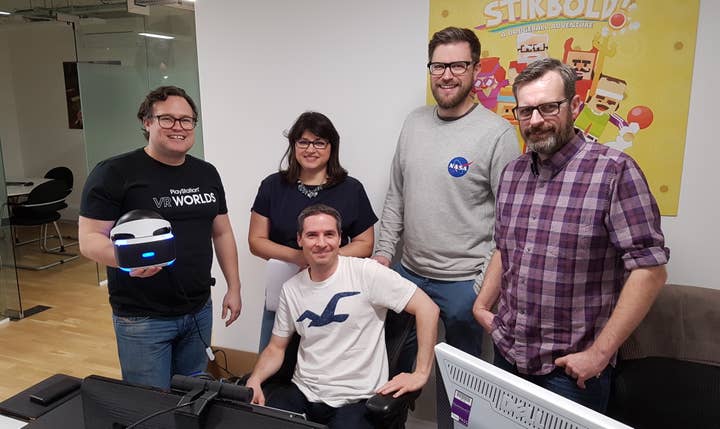“Consumers at home are only part of the picture for VR”
Kuju's head of studios Brynley Gibson encourages developers to look beyond games when getting to grips with virtual and augmented reality
Like so many companies over the past few years, UK work-for-hire developer Kuju has been ramping up its efforts in the virtual reality space. Last month, the firm announced the medium would become a major focus for its team in 2017, thanks partly to the hiring of new head of studios Brynley Gibson.
Gibson previously held the role of executive producer at PlayStation's London Studios, which led development for the tech demos used to showcase Project Morpheus, later launched as PlayStation VR. These tech demos also formed the basis of PSVR launch title PlayStation VR Worlds.
Kuju hired Gibson back in October to lead this push into the virtual reality market, but prior to his time at Sony, the producer wasn't entirely impressed by the technology.

"I haven't always been a die-hard VR fan," he tells GamesIndustry.biz. "I started with a healthy level of scepticism. When I made VR Worlds for PlayStation I was experiencing and experimenting with VR every day. By the end of the project, I ended up a genuine fanatic. I saw what was working and got to understand the limitations. I also watched hundreds of demos and witnessed the magic of VR at work. Time after time people came out of the headset with a look of joy and a changed view. I'm now like an ex-smoker wanting everyone to join me on the other side.
"I now firmly believe that AR and VR will completely change people's lives in the future. The power of these technologies offers unique opportunities that other media cannot. VR's ability to transport people to a place or a moment and elicit an emotional response from them is utterly unique. AR is more functional, one of its unique selling points is the offer of persistent enhancement. Picture having that layer of context sensitive information assisting you as you go about your day - that is a real prize. These technologies will integrate into our daily routines, becoming something we use automatically."
Gibson's optimism is not matched by everyone in the industry. 2016, originally tipped to be a pivotal year for the rise of virtual reality, ended somewhat sourly, with many of the technology's proponents less enthralled by the market's slow progress. Despite the launch of three commercial devices - Oculus Rift, HTC Vive and PSVR - sales figures have been few and far between. PlayStation's headset seems to have the largest confirmed audience at more than 915,000 units, but even this is behind what some VR advocates had hoped for.
However, Gibson believes the seemingly slow consumer adoption can be attributed to a "classic post-launch slump", confident that sales will pick up as more becomes available for each device.
"By the end of working on PlayStation VR Worlds, I ended up a genuine fanatic. I'm now like an ex-smoker wanting everyone to join me on the other side"
"Consumer adoption will come in time with a steady development of the marketplace," he says. "The numbers for the console and PC systems seem in-line with where many thought they would be. The numbers for mobile units are looking healthier and continue to grow at pace. In ten years, we can have true adoption and enough users to make a sustainable marketplace. As we build towards that, much is going to change and the momentum will come naturally.
"Commercial use is steadily growing and will be part of what switches consumers onto VR. It will make it familiar and sell how fantastic it can be. Platform holders will continue to find new ways to tickle the interests of the public. It is all about engineering that all-important first experience.
"During the next decade, VR technology, content and developers' skills will all improve. Content we are seeing now will seem primitive. The use of these technologies will steadily normalise. Access will be easier and less daunting. Price will have reduced and form factor refined. The experience of engaging with VR at all levels will have streamlined. All the right moves are taking place. Time is the big factor to build a new market."

That does not, Gibson says, mean that all developers should suddenly invest heavily in virtual reality. Traditional media, he maintains, will continue to be "the dominant force" but it never hurts companies like Kuju to prepare for the growth of promising markets.
"New technologies and platforms are coming along all the time and we look to be ready for them," says Gibson. "Nintendo Switch is a good example of that; it is not VR and we are getting to grips with it. VR and AR is only a part of our strategy.
"Companies that are not software developers should be looking at how they can use VR and AR for their business. They will find strong reasoning for commissioning software, both for internal development of staff and for public facing engagement."
The lack of virtual reality headsets in people's living rooms (or wherever they play video games) may be something of a deterrant for cautious developers yet to make the leap into this space, but growing interest in VR from beyond the games industry means there are plenty of opportunities for studios to get to grips with the technology without the pressure of winning over the public.
"Consumers at home are only part of the picture. Companies need to look at who else is using VR, what they are using it for and in what situation. Doing so gives us a much larger market"
"Consumers at home are only part of the picture," Gibson stresses. "Companies need to look at who else is using VR, what they are using it for and in what situation. Doing so gives us a much larger market beyond the home consumer. VR projects are being developed in almost every industry - fashion, engineering, defence, to name but a growing few. Entertainment is one use; education and training are others.
"We are already seeing it being used to great effect in public facilities such as museums. In China there has been great success with VR arcades and that will grow here too. This broader view gives you a bigger market.
"If you are making content for public consumption, then you need to cut your cloth to the size of the market. For independents, going multi-platform is a must. Finding financial support from additional partners who have a stake in VR is also a wise move."

"It is a distraction to have arguments that VR, AR or Mixed Reality will be the 'winner'. Each technology will develop within their own space"
Still, it's hard not to feel that even the biggest companies in VR have had their faith shaken by the technology and its stumbled launches. Gibson's former employers PlayStation laid off several members of staff at the London studio a month before PSVR even landed on shelves, with the closure of Guerilla Cambridge following at the start of the year. Does this suggest some companies have overinvested in virtual reality and are suffering for the lack of recouped costs? Gibson disagrees.
"It is always a shame to break up a great team, but it is not abnormal," he says. "At the end of most large projects, there's a downsizing of the team. For better or worse, it is part of the cycle for game development, VR or otherwise."
He remains confident that demands for virtual reality developers - particularly from non-gaming sectors - will rise as the technology gains traction, putting his new team at Kuju in good stead as a work-for-hire partner.
"There is still much untapped potential in this market," says Gibson. "Our strategy is to focus on brands and licences. Some of our clients won't have any experience on VR and AR and it will be our mission to communicate the potential of the medium. Previously we have developed non-VR titles for brands like Pokémon, Risk and Zumba on console and handhelds but with these technologies it is a step change. We can create experiences that immerse and engage unlike anything else."
It's worth noting that while Gibson's experience is primarily in virtual reality, Kuju intends to also establish itself as a creator of compelling augmented reality projects as well. Of the two, VR often dominates the conversation - particularly in the games space - but Gibson insists that demand for AR is also expected to grow.
"The technologies share some similarities but produce very different experiences," he says. "I've been lucky to have in my team those who have worked intimately with AR. That includes HoloLens and Sony AR projects for Vita and PlayStation 3. The knowledge and experience they bring is invaluable for getting projects started.
"I believe AR will get more time in the limelight and we will see strong growth with that technology in the next couple of years. It is a distraction to have arguments that VR, AR or Mixed Reality will be the 'winner'. As the technologies each have distinctive strengths it is not an either-or situation. Each technology will develop within their own space. The potential they all have is staggering and consumers are going to be the ultimate winners."








